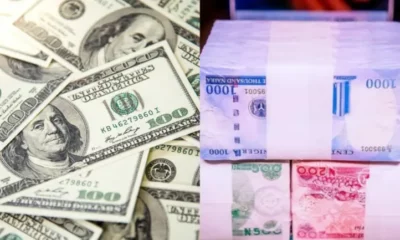Top Stories
Oil price surge to boost Nigeria’s foreign reserve by almost $3 billion – Fitch
Oil price surge to boost Nigeria’s foreign reserve by almost $3 billion – Fitch
Fitch Ratings has projected that Nigeria’s foreign reserves would increase to $43 billion in 2022, up from $40.5 billion at the end of 2021, indicative of an uptick of almost $3 billion.
This was disclosed in its latest report released on Monday, March 14, titled ‘Fitch affirms Nigeria at ‘B’; Outlook stable.’
Fitch Ratings has maintained Nigeria’s Long-Term Foreign-Currency Issuer Default Rating (IDR) at ‘B’ with a Stable Outlook, as it did a year ago.
The ‘B’ rating could be categorized as being in the non-investment-grade category when compared with the investment-grade category of ‘BBB’ to ‘AAA’. However, the ‘B’ may be seen to have a stable outlook as it is rated above the ‘CCC’ to ‘D’ (default).
Fitch stated that Nigeria has a low World Bank Governance Indicator (WBGI) ranking at 16.4, reflecting weak institutional capacity, uneven application of the rule of law and a high level of corruption.
What you should know
- Nigeria’s foreign reserve dropped to $39.86 billion as of the end of February 2022, representing a 0.44% decline compared to $40.04 billion recorded as of the previous month.
- According to data from the CBN statistical bulletin for Q3 2021, the apex bank supplied a sum of $8.97 billion in the FX market through the I&E, SME, and invisible.
- Also, the CBN supplied $1.42 billion through interbank, while $2.77 billion was channelled through BDC operators between January and June 2021, before the bank discontinued the sales of FX to them.
- The Organization of Petroleum Exporting Countries (OPEC+) increased Nigeria’s production quota to 1.72 million bpd for March 2022 from 1.7 million bpd and 1.68 million bpd in February and January respectively, despite being unable to meet previous targets.
This brings to question the capacity for Nigeria to enjoy the benefits of a surging price.
What Fitch is saying
Fitch attributed the projected improved external liquidity to the surge in oil prices. The report said, “Nigeria’s gross international reserves have been bolstered by higher oil export receipts, which will continue in 2022. We forecast reserves to increase to USD43 billion in 2022, up from USD40.5 billion at end-2021.”
According to the report, oil exports and remittance inflows combined to help restore the current account (CA) into balance in 2021, following a deficit of 4.2 percent of GDP in 2020.
“Our baseline assumption is for the CA balance to remain broadly unchanged in 2022, but sustained higher oil prices at their present level of USD112 per barrel could widen the 2022 current account surplus to 4% of GDP, with upside to Nigeria’s international reserves,” the report said.
Fitch also mentioned the disruption caused by fuel subsidies on Nigeria’s Fiscal Balance. “In January 2022, the government reversed a plan to phase out the implicit fuel subsidies that support price controls on petroleum. This has necessitated an adjusted federal government budget for 2022 with a deficit target that is 0.6% of GDP wider than the original target, due to the subsidies (with an additional equal hit to the other levels of government),” it said.
It added, “Higher oil prices would also boost the subsidy cost, denting the benefit of higher global oil prices to the budget. We forecast the 2022 general government fiscal deficit to remain broadly unchanged from 4.1% of GDP in 2021. However, we estimate that an USD10 per barrel increase would narrow the fiscal deficit by 0.5% of GDP.”


 Politics15 hours ago
Politics15 hours agoBreaking: Prominent Nigerian Politician Is Dead(Photo)

 News18 hours ago
News18 hours agoFormer ECOWAS Court VP berates EFCC chairman over press briefing on Yahaya Bello

 Top Stories18 hours ago
Top Stories18 hours agoBreaking: Parents ‘suspect foul play’ as boy, 4, dies in BrickHall School Abuja

 Politics22 hours ago
Politics22 hours agoSanwo-Olu Launches Eko Cares Intervention For 500,000 Lagosians

 Top Stories12 hours ago
Top Stories12 hours agoRunway Mishap: ART Kicks Against Dana Suspension, Cautions Festus Keyamo

 Politics18 hours ago
Politics18 hours agoBreaking: 118 Inmates Escape As Rainstorm Wreaks Havoc At Suleja Prison

 News22 hours ago
News22 hours agoTop Nigerian Newspaper Headlines For Today, Thursday, 25th April, 2024

 News22 hours ago
News22 hours agoBlack Market Dollar (USD) To Naira (NGN) Exchange Rate Today 25th April 2024




